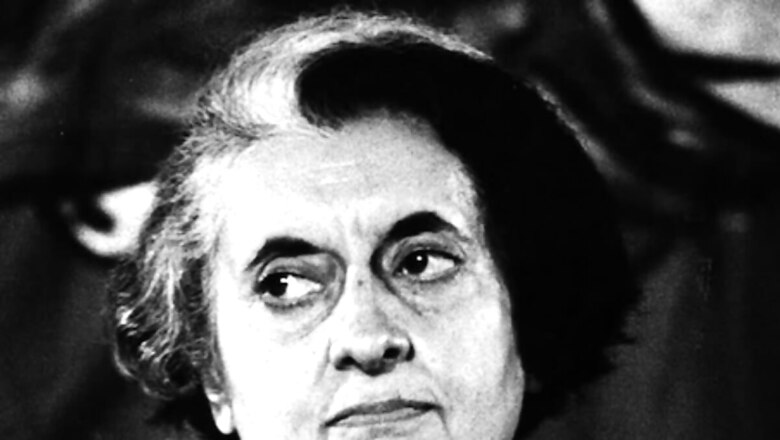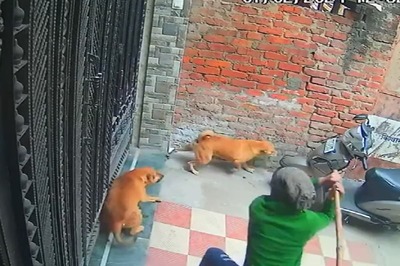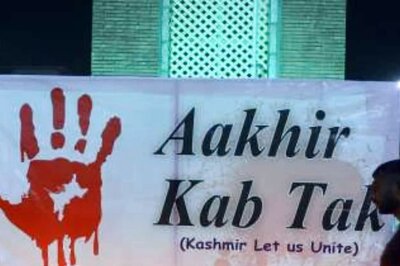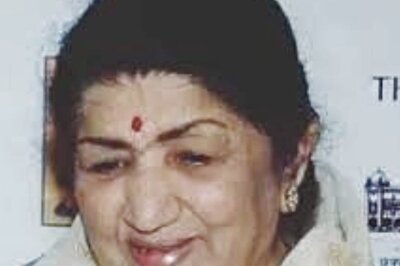
views
The Emergency was declared without warning on midnight of June 25, 1975, and the country woke up to the death of democracy. Prime Minister Indira Gandhi on the morning of June 26, through All India Radio addressed the country, “The President has proclaimed Emergency. There is nothing to panic about”. This led to the beginning of the darkest hour of Indian Democracy.
President Fakhruddin Ali Ahmed proclaimed an Emergency due to internal disturbances under Article 352 of the Constitution of India on the recommendations of the government led by Indira Gandhi. The Emergency remained in effect for a 21-month period from June 25, 1975, to March 21, 1977. Thus, elections were suspended and civil liberties were curbed. This was the third time that a national emergency was declared in India, the first two times were during the wars with China and Pakistan in 1962 and 1971 respectively.
The Article 352 of the Indian Constitution proclaims that the President of India can declare a National Emergency if the security of the country is at stake and is threatened by either war, external aggression, or internal disturbance/armed rebellion.
Let us get to know more about the most controversial time in independent India’s history in Classes With News18.
What led to the declaration of Emergency?
Months before the emergency, the entire country was facing a crisis in all spheres, whether social, economic, or political. The economy of India was in very dismal condition, with unemployment at its peak, inflation galloping, and food scarcely available.
January 1974 saw students in Gujarat protesting against rising prices of food grains and other essential commodities and corruption in the state government, which soon found support with major opposition parties joining it. This led to the imposition of the President’s rule in the state. Demands for fresh elections became intense. Subsequently, elections were held in Gujarat in June 1975, which the Congress lost.
Furthermore, students in Bihar started a movement in 1974 to protest against the same issues and they invited Jayaprakash Narayan (JP), who had given up active politics and was involved in social work, to lead it. His acceptance of the same took the issue to a national level. It got so popular that the movement was henceforth called as JP Movement.
On June 12, 1975, Allahabad High Court held Indira Gandhi guilty of electoral malpractices and barred her from holding any public office for 6 years. Her election from UP’s Rae Bareli constituency in the 1971 Lok Sabha elections was annulled. After this Indira Gandhi appealed in the Supreme Court and continued in office as the Prime Minister.
Narayan led a huge political rally in Delhi’s Ramlila grounds on June 25, 1975, where he announced a nationwide Satyagraha for Indira Gandhi’s resignation. The government perceived this as incitement and felt that it would bring all government machinery to a standstill. The employees of the Railways too called for a nationwide strike, led by George Fernandes.
On June 24, the Supreme Court granted Indira Gandhi a partial stay on the High Court order – till her appeal was decided and that she could remain an MP but could not take part in the proceedings of the Lok Sabha. The government responded to the June 25 strike by declaring a state of emergency that night itself.
The Period of Emergency
As soon as the national emergency was proclaimed by the President of India, all the powers were concentrated in the hands of the Union government. The Emergency period in the country saw the arrest of over one lakh people who were protesting or raising their voices against the Central government. Many opposition leaders and activists went underground. All constitutional rights including fundamental rights were suspended.
Freedom of speech and press was withdrawn. All newspapers needed to get prior approval for the articles to be published. National family planning campaign was launched and millions were forced to undergo sterilization through operations. Non-Congress state governments were sacked. Many slums in Delhi were destroyed. There were many instances of human rights violations in India. Curfews were imposed and the police detained people without trial. General elections were also deferred twice and the session of parliament was increased.
What Happened After Emergency
The government on March 21, 1977, revoked the emergency and finally declared elections. The opposition united to form a new party -the Janata Party under the leadership of JP Narayan and for the first time since independence, the Congress was defeated in the Lok Sabha elections. The Congress could win only 154 seats in the Lok Sabha, whereas the Janata Party got 295 seats. Indira Gandhi was defeated in Rae Bareli, as was her son Sanjay Gandhi from Amethi. Morarji Desai became the Prime Minister of the first non-congress government formed.
To learn about other topics taught in school, explained by News18, here is a list of other Classes With News18: Queries Related to Chapters on Elections | Sex Versus Gender | Cryptocurrencies | Economy & Banks | How to Become President of India | Post Independence Struggle | How India Adopted Its Flag | Formation of States & United India | Tipu Sultan | Indian Teachers Day Different from Rest of the World |Queen Elizabeth & Colonialism |
Read all the Latest Education News here




















Comments
0 comment